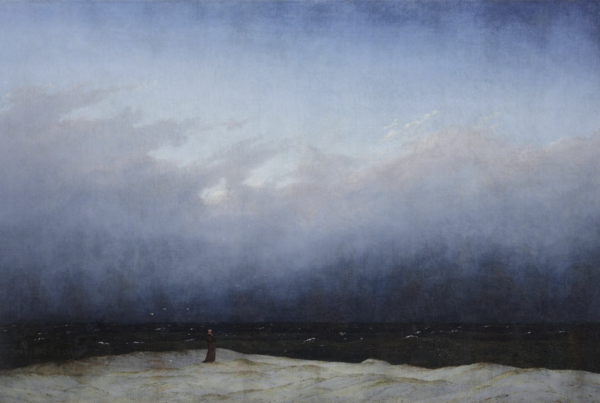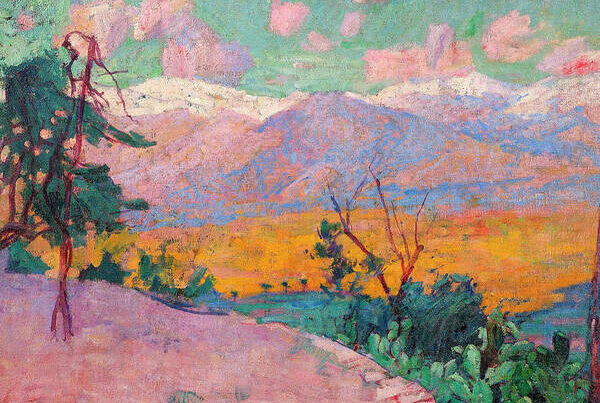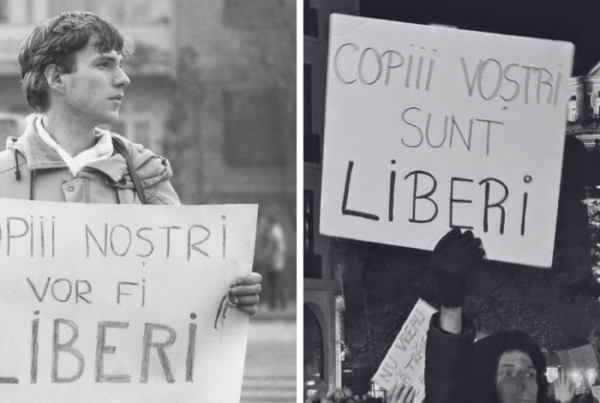This piece is part of the collaboration between The Sundial Press and International Policy Review at IE University.

Image Credit: Mason Brown
By Mason Brown. Edited by Andrea Maria Sanchez Deras.
THE FOX’S SHADOW
Mason Brown
Warmth is not for autumn to light the fox’s shadow. What lingers in the Unknown, one finds also in themselves. Here the fire dwindles, less be stoked and given rise. In autumn, come the darkness, making warmth by one’s own breath.
***
The quick brown fox jumped over the fence, but its shadow slipped beneath. And when he fell again, he sunk into the earth. The forest cradles many, but the wind shakes at the trees, and when one knows not what it says, all that comes is chilling breeze.
“You should not leap so high, or sly, it may blow you away. You belong upon the ground, where your paws leave many prints.”
“I cannot see them. I am lost,” the fox replied to his shadow, head sunk low and ears pricked high. The forest was darker than the sight lent to his eyes.
“Nor can you see your face, but know you it is there. I feel the footfalls come and go upon my great shade. Take comfort in my veil.”
“Your shade I cannot see either. Sometimes I wonder if you are still here.”
“Always am I. In this dark autumn wood, I am shapeless, but still you are bound to me, Zorro. Step into the sun, and you will see.”
The fox did not. He feared what the sun would reveal, what would be left to him when exposed. Instead, he followed his shadow which was the darkness of all the forest.
***
Night makes shadows bolder. By day, sun-scorched leaves writhe in a golden canopy—the inferno. But only a full moon saw the skies of night, and its silver caught only in the shadows’ eyes. Tonight, the fox was a shivering, hungry thing.
“Come, you will eat.”
“Will I?”, the fox asked.
“You have killed.”
“Have I?”
“Ignorance is no way to survive. The blood is yours or it is theirs. Drink it and eat, or the forest will do to you what you have done to so many others.”
“When I am full, will the hunger end? It seems always to come again, however much I consume. Is my strength stolen by the wind as you say, or is it that this killing is a hollow thing that serves no end? Surely, death does not follow me everywhere I go, stealing from me always. What could death gain from my loss?”
“But for more death? This is the way, Zorro, of the darkness consuming the forest of all things. But death you will not meet. It is kind to you in leaving you with my company, for with me, you will eat, and be full, and when the wind takes this from you, as I say, you need only eat again.”
The ground was wet and red where the rabbit laid. The fox’s fur was wet and red. His eyes were wet, his tongue red, his shadow black.
There is no gentle way to consume. Living is a wet and bloody dance that leaves one filthier than death, or so the fox was told—so he believed? His shadow would allow no other death to creep up on him, but sometimes he wondered if this was not a false mercy. To dance the darkness with so few colours, and these few colours being the flash of death quieting another’s song . . . could there be no other colour in living but for death?
When the rabbit was gone, the wet and red remained to the fox. He was warm in the stomach, but cold in the heart. So soon as he moved from this place of consumption, it was lost to the forest, and so then was he. Perhaps he should have slept there, but he was afraid of being haunted. Only his shadow, not even the fox himself, saw where his paws wandered on these shivering nights.
The fox came to the lakeside and drank from the gloom. A face of gore with two eyes flickering silver judged him unworthy of the waters, and he retreated, afraid too, of himself. If the fox slept, he did not sleep well, for the shadow that was so large a part of him would ne’er resign to sleep itself. Thus, the fox dreamt only of his darkness gazing upon a listless body that was in sleep as lost as in wakefulness.
***
“You will eat. Kill the boy.”
The fox had woken suddenly to the disturbed sounds of life. The forest was thin here, the autumn dawn leering. Children wandered through the edge of the wood crying to one another in what should have been anguish over their being lost, but was instead a sound unfamiliar to the fox, though not altogether different. They bore their teeth and ran headlong as if in pursuit of the other, but would often fall clumsily about, and would sometimes stop, grow very quiet, and gaze into the forest still baring their teeth and making these strange noises.
It was the faint dawn that betrayed the fox, trembling in the leaves strewn by autumn’s chill wind.
“He doesn’t belong here,” the fox told his shadow who stalked the boy venturing closer than the rest.
“No more than you belong out there, yet he has come nonetheless. Death is among the many things in the forest of all things, the curator of what belongs and what must leave. Perhaps a boy’s bones belong, but his soul does not. Kill the boy, or face the equal death brought from his realm here.”
The boy came closer. Whatever fear or mockery the fox was mistaking his laughter for was washed by the stillness of awe. The fox took this for want to live, to see the woods and still return from them, as the fox himself hoped to return from his brushing with the children of mirth.
A hand reached for the fox, pinned against a thick oak. His shadow retreated behind him and whispered into his ear.
“Kill the boy.”
“Please! You’ll cut yourself upon my wildness, and bleed into the shadows. It mustn’t be . . .”
The fox bit the boy, who did not yelp but stared back in dismay. The fox’s eyes were wet, his tongue red, his shadow black. Afraid of himself as much as the boy, the quick brown fox fled into the darkness of the forest which was his shadow.
***
Only when storm rent the forest canopy did the fox’s thunderous paws relent. He was far from his sin. All the time he ran, his shadow tugged back on his neck, every footfall landing uneasy upon the leaf-litter and sinking into the muddy earth. Any prints he left upon this great shade belonged to his shadow, and that was all of them.
But where the storm found him, atop the structure of man and beneath the smite of lightning, his shadow could not go. The fox paced between either end of the bridge, each warning him away, his shadow whispering from below, dark nothings lost to falling sky and rising river. The fox paced until he knew not whence he came and both sides were consumed by the Unknown.
“I have come to ruin, where the leaves fall at last before winter!” he cried beneath such sky-splitting that no one could have heard him. “Should either side have me, it would be washed with blood, and I would be no more alive than here, where surely I will die beneath the judgement of the swelling flood.”
The wind howled through the trees and broke upon the bridge, but even in its enormity, it brought nought to the fox but for bitter cold.
“My soul subsides where autumn does not . . . let winter come, and thus my pounding heart still . . .”
For all his want to lie upon the bridge, knowing death to visit here, the same shadow that chased him there now snapped his neck toward the water’s edge and forced the fox to choose: drown, or struggle.
The fox struggled, and in struggling, lived.
***
Whichever side took him, he was consumed by the Unknown, and was washed with blood. The hollow of a tree sheltered him. Curled up with the darkness of his shadow, the fox suffered the consequence of his living.
“It is wet, even here. Is there nowhere the storm does not reach?”
“Where the storm does not reach, you reign yourself. This hollow is the hollow of your heart, Zorro, and it will shelter you from much. You mustn’t fill it but with the death of your living, or you will have no appetite for what must be.”
The earth was lofted at the base of the tree. Stones kept thunder at bay, and the tree was poised such that the rain could not enter. Yet it was wet, and the wind crept its way in as well as his shadow had. Amidst the storm-lit shudders, he saw only red.
Sleep came broken while the storm throbbed, and lingered after it had waned, but left the fox with no greater strength when he woke to a still dark world and the anguish of the rabbit whose den he had stolen. His legs rose with great effort, like an oak’s leaves bearing the weight of early snow, only his snow was red. His eyes were wet, his tongue red, his shadow black.
“You have lucked into a good place. This might have been your grave if you did not make it your harvest.”
“I needn’t kill . . . please, I am not hungry,” the fox cried.
“Hush. It is already done. I’ve done this for you, Zorro, because I am as much your will to live as your need for death. This one will see its good fortune that it was not in our company and struggle along its grateful way.”
But the rabbit did not. Some loyalty the fox could not understand drove the rabbit into its den that the storm had thrust it from, and where its children were wet and red in the fox’s shadow, the rabbit wept. It wept from its heart, some yearning for life that did not come merely from fear of death. There was a warmth in the rabbit, a warmth that was in many things the fox killed and ate, a warmth that did not fill the hollow of the fox’s heart when the flesh filled his stomach.
Although the wind was quick to sap the strength of one’s meal, it seemed unable to quench the flame of the rabbit’s heart. This flame seemed the cause of the rabbit’s anguish when the fox laid no claw on the creature, and this anguish chased the fox from the den as fiercely as the storm had chased him in.
***
Night makes shadows bolder, the moon their only foe, but as the months turn colder, so does their sunlit vestige grow. So pale a thing does the sky become at the turning head of autumn, that it greys and falls into a drape threaded by the strengthened night. The shadows must grow stronger, for the forest inferno falls to ash, and the naked trees bare the Unknown to the thin light of day. This is not enough to warm by, less there is in one’s own breath the embers of inner flame. If there is, unlike as with our fox, one might outlast a winter one’s shadow could not, and find themselves by spring somewhere brighter and warmer than any of the dark forests of yesteryears.
Helped along by prior storm, autumn faced its own death now.
There were fewer places to find food, and no place to find warmth. Amidst the fox’s lonely red parade, he chanced upon the place he bit the boy, near to the forest’s edge.
Where the many late rabbits’ faces blurred into cold and ruddy guilt, the boy’s rose starkly to the surface of his memory. There had been flame in the boy’s face, in the boy’s heart. But there had been no anguish, no hostility, no sure struggle in living. This flame, then, the same one lit within the rabbit, was not so lit by the apparent anguish of death as had taken hold of the rabbit in the bath of its children’s blood, but was alive as well as the boy was, or perhaps even gave him that life. This flame burned with life. The boy’s expressions had been laughter, the fuel of this life-flame that the fox still did not understand but was beginning to notice.
Where the children had been laughing, there slept the remnants of man—an iron carriage rolled into the forest and claimed thoroughly by moss and vine. There was a strange colour to the carriage, but whatever colour it was, and the fox could not rightly say, it was well corroded by a rust that was the blood of man’s many creations.
“Fear this creature, Zorro, for it has been collected here in the willow’s snare. It is not natural, not forgiving, and will crush you so soon as you make yourself known. Be silent. Remain to the darkness that is your warmth and comfort. Submit to the Unknown.”
But the darkness offered less warmth these days, if ever it had. In the forest of all things, many of them are remnants of man. The fox has leapt decrepit fences and crossed crooked bridges, but never before had he any curiosity to seek out these treacherous creatures.
“Is it alive?”
“If ever it was, it is dead now.”
Seeing that the fox remained unphased, the shadow squeezed around his chilly neck.
“With death comes a certain honesty. A thing’s brightest features, revealed to be their ugliest. Its hope, gluttony. Its greed and malice, leaving a trail of destruction through your forest.”
Something glinted within the decay of autumn, much like a lone star peers through a clouded night. The fox approached it with caution, but for once ignored the warnings of his shadow. Shivering fur and chattering teeth left him feeling rather unconcerned with consequence and willing to gamble for warmth against death—in truth, not preferring one to the other.
“Beyond the darkness, these sins bask in the light. Zorro, dawn looms nigh. Do you wish to live?”
Stooping to look upon the source of such peculiar unrest—as he might stoop to drink from the lake guarded by his visage, a visage that was his broad shadow, black but for the redness of the blood of his living and the silver of a phantom sun twice reflected in his eyes—for once the fox did not see his shadow, but saw much else:
A bath of blue, the waking dawn
Awash with clouds blown aching on
No secrets kept, the fences leapt
The sky unveils an autumn gone
Some tide of flame, the season swept
Ensuring that no colour slept
Should death befell, leaves bade farewell
A fox will find the trees have wept
Their green and gold, and caramel
Fall gently o’er last harebell
His orange fur, a cold ember
Adrift the skies no shadows dwell
A face is wet, as rainfall were
Gone darkened by some inward spur
They kind in heart, where fires start
Yet lost to snows of December
***
Somewhere, the sun has risen, and somewhere the Earth has warmed. Somewhere in the Unknown, the skies are bright and spring has formed. But here, the fox is buried, and here the leaves have burned. Here in the Unknown, autumn died and winter churned.
Lain upon a bare hillside, the wind sweeps a blanket of last autumn leaves, rusted and brittle, over the fox’s still form. The lightness of first snowfall soon grows heavy, and the pounding of his heart stills beneath its weight. Snow burial encases the fox and his shadow, one pressed against the other until they could not have been different creatures.
Winter comes.
Darkness lingers.
Lungs too cold to speak, wind too hungry to eat their frozen words—silence reigns.
If the sun continued its twisted dance even through the snowy skies, the fox would not have known. Just as soon as colour filled his eyes, he closed them. They were tired, and he was cold, and there seemed some warmth in death knowing that it was only one of life’s many colours.
The sky was blue, the flowers pink, the moonlight silver in midnight drink. The ferns were green, the gloaming plum, leaves of gold and crimson swum. And the fox’s fur, sometimes red, was woven by an orange thread.
He was not always so full of beauty, but neither was he darkened by so black a shadow. Looking inward, here beneath the snow burial where there was nought else to look upon, the fox contented himself with being brown.
“Come, you can eat!”
Frost thawed on the fox’s face. His eyes were wet. Across a crackling fire sat a boy, hands outstretched, trustingly, offering a morsel from the fire. After a long time, and with great effort, the fox licked the boy’s hand—not where he held the food, but where once his teeth had torn the boy’s flesh.
The boy laughed, and a great ember leapt between them, the fox’s heart shuddering to life, his tongue red and his breath warm against the winter air. Daylight stroked the snowy hilltop, and somewhere in the forest of all things that shone in the winter light, the fox at last heard the whispers of the wind that was his shadow:
“You will live, dear Zorro, trust the boy.”
Other posts that may interest you:
Discover more from The Sundial Press
Subscribe to get the latest posts sent to your email.




